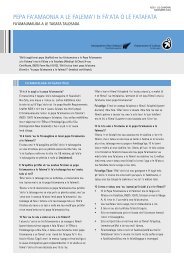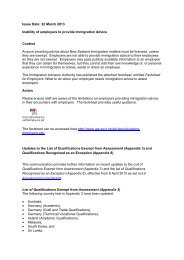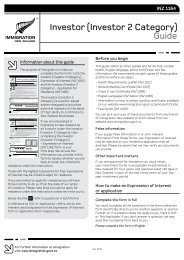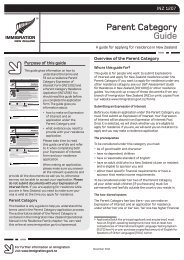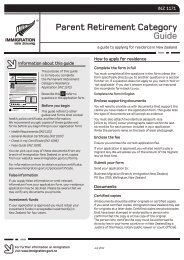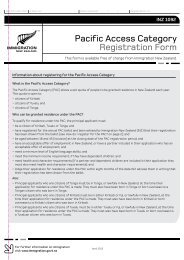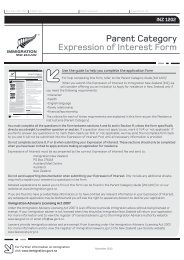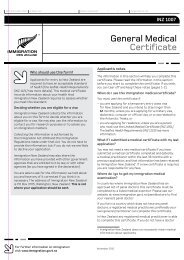04 HOUSING - Immigration New Zealand
04 HOUSING - Immigration New Zealand
04 HOUSING - Immigration New Zealand
Create successful ePaper yourself
Turn your PDF publications into a flip-book with our unique Google optimized e-Paper software.
<strong>04</strong> <strong>HOUSING</strong><br />
EVERYTHING YOU NEED TO KNOW<br />
ABOUT FINDING A HOME<br />
IN NEW ZEALAND
RENTING A HOME<br />
WHEN YOU ARRIVE IN NEW ZEALAND IT IS A GOOD<br />
IDEA INITIALLY TO RENT A HOME WHILE YOU DECIDE<br />
WHERE YOU WISH TO LIVE.<br />
Since <strong>New</strong> <strong>Zealand</strong> has a high level of home ownership, the stock<br />
of rental housing is less extensive than in most other developed<br />
countries. Prices and quality vary and it is always advisable to<br />
visit a property personally before signing a Tenancy Agreement<br />
(also known as a lease). First appearances can be deceptive –<br />
make sure you check the basics. Parts of <strong>New</strong> <strong>Zealand</strong> can be cold<br />
and houses that do not get a lot of direct sun may have problems<br />
with dampness during the winter months. Factors such as proximity<br />
to transport, shops and schools, as well as the general feel of the<br />
neighbourhood, also need to be taken into account. It is a good<br />
idea to find out about all your legal rights and responsibilities<br />
well before signing a lease. The Tenancy Services division of the<br />
Department of Building and Housing can help you with this.<br />
Most rental properties are unfurnished, apart from an oven,<br />
a laundry facility and things like curtains and carpet. The landlord<br />
does not have to provide a heater so, in some cases, you may<br />
have to provide your own.<br />
Demand for good quality rentals is high. It may take some time<br />
to find a suitable property and, when you do, you will usually<br />
have to make a quick decision.<br />
WHEN RENTING A HOME,<br />
IT IS ALWAYS IMPORTANT<br />
TO VIEW IT FIRST,<br />
AND CHECK EVERYTHING<br />
CAREFULLY BEFORE<br />
SIGNING AN AGREEMENT. 01
02<br />
“YOU CANNOT BE REFUSED<br />
A RENTAL BECAUSE YOU<br />
HAVE CHILDREN.”<br />
LEE CHISHOLM – NORTHERN<br />
REGIONAL MANAGER, TENANCY SERVICES.<br />
Where to look<br />
The To Let columns in the newspaper, especially on Wednesdays<br />
and Saturdays, are a good place to start. You need to phone about<br />
places early, as the best flats/apartments and houses go quickly.<br />
You can also pay for an advertisement in the newspaper’s<br />
Wanted to Rent column.<br />
Median weekly rental prices in <strong>New</strong> <strong>Zealand</strong><br />
(for the three months to May 2007)<br />
Two Three<br />
Region Bedrooms Bedrooms<br />
Northern Auckland $321 $395<br />
Western Auckland $265 $325<br />
Central Auckland $330 $410<br />
Southern Auckland $285 $345<br />
Hamilton $220 $295<br />
Tauranga $240 $300<br />
Rotorua $175 $230<br />
Napier $220 $300<br />
<strong>New</strong> Plymouth $220 $280<br />
Palmerston North $180 $250<br />
Upper Hutt $187 $300<br />
Lower Hutt $300 $360<br />
Porirua $240 $280<br />
Wellington City $330 $400<br />
Nelson $235 $290<br />
Christchurch $240 $300<br />
Dunedin $220 $255<br />
Invercargill $147 $140<br />
<strong>New</strong> <strong>Zealand</strong> average $250 $300<br />
Source: Tenancy Services, Department of Building and Housing<br />
www.dbh.govt.nz<br />
The Latest Rents<br />
Detailed rental information for every suburb in <strong>New</strong> <strong>Zealand</strong> is<br />
updated monthly and can be found at www.dbh.govt.nz/market-rent
HOW TO READ A REAL ESTATE ADVERTISEMENT<br />
A brief guide to common abbreviations<br />
ac air conditioning<br />
alc alcove<br />
BBO Buyer Budget Over<br />
BEO Buyer Enquiry Over<br />
bi built-in<br />
bics built-in cupboards<br />
bir built-in wardrobe<br />
bt brick walls with tile roof<br />
bv brick veneer<br />
CBD Central Business District<br />
cpds cupboards<br />
ctl cement tile<br />
CV Commercial Value<br />
det detached<br />
elf electric light fittings<br />
elhws electric hot water service<br />
ens en suite bathroom<br />
fib fibro cement<br />
fitts fittings<br />
fl covs floor coverings<br />
f/furn fully furnished<br />
f tld fully tiled<br />
ghws gas hot water service<br />
GV Government Valuation (same as QV)<br />
ingr pl in-ground pool<br />
k’ette kitchenette<br />
ldr lounge dining room<br />
l’fitt light fittings<br />
lug lock-up garage<br />
LV Land Value<br />
neg negotiable<br />
ofp open fireplace<br />
oil/htr oil heater<br />
ono or nearest offer<br />
ophws off-peak hot water system<br />
osp off-street car parking<br />
oyo own your own<br />
pa per annum<br />
pmth per month<br />
pol flr polished floor<br />
posn position<br />
pw per week<br />
QV Quotable Valuation (same as GV)<br />
rc reverse cycle<br />
rend rendered<br />
rf roof<br />
row right of way<br />
RV Rateable Value<br />
sb solid brick<br />
shwr rcs shower recess<br />
s’out sleep-out cabin<br />
stca subject to council approval<br />
tc tile terracotta tiles<br />
tf timber frame<br />
tld rf tiled roof<br />
umr under main roof<br />
ven blds venetian blinds<br />
ver verandah<br />
vp vacant possession<br />
wb weatherboard<br />
wi wrought iron<br />
wi pant walk-in pantry<br />
ww crpt wall-to-wall carpet<br />
03
<strong>04</strong><br />
Real estate agents<br />
Many real estate agents also deal in rental properties. Their<br />
commission charges are due only once a rental contract is<br />
completed, and these should not exceed one week’s rent.<br />
Letting centres<br />
These centres will usually charge a fee for you to look at their<br />
listed properties. The fee is generally less than that charged by<br />
real estate agents, but it may be charged even if you do not find<br />
a home through their lists. If you are referred to a real estate<br />
agent by the letting centre, you may also have to pay the real<br />
estate agent’s fee.<br />
Discrimination<br />
By law, a landlord cannot discriminate against you because<br />
of your colour, race, gender, ethnic origin, disability or religious<br />
beliefs.<br />
If you think you have been discriminated against, contact either:<br />
Tenancy Advice Line<br />
Visit: www.dbh.govt.nz<br />
Freephone: 0800 83 62 62 (0800 TENANCY)<br />
The Human Rights Commission<br />
Visit: www.hrc.co.nz<br />
Freephone: 0800 496 877<br />
A LANDLORD CANNOT<br />
ENFORCE WHAT IS OUTSIDE<br />
THE LAW AND TENANTS<br />
CANNOT GIVE AWAY THEIR<br />
LEGAL RIGHTS.
Bonds<br />
Most landlords require tenants to pay a bond that is generally<br />
equivalent to 2 or 4 weeks’ rent. Landlords cannot ask for more<br />
than 4 weeks’ rent as bond.<br />
The landlord will provide you with a Bond Lodgement Form<br />
that both you and the landlord are required to complete and sign.<br />
The landlord must deposit the form and your accompanying<br />
cheque for the bond with the Department of Building and Housing<br />
within 23 working days of receiving it. A receipt will then be sent<br />
to both you and your landlord. If you don’t receive this receipt<br />
you should contact the Tenancy Advice office of the Department<br />
of Building and Housing (See P18 for contact details).<br />
The bond will be refunded to you when you leave the property,<br />
unless you have rent owing or have caused damage. If the property<br />
is damaged, some or all of your bond is used to pay for the repair.<br />
When you give notice to move out, the landlord will inspect<br />
the property to make sure you have not caused damage. To recover<br />
your bond, complete a Bond Refund Form, signed by both you and<br />
the landlord, and send it to the Department of Building and<br />
Housing. If you cannot reach agreement with the landlord over<br />
the return of your bond, contact the Tenancy Advice office at the<br />
Department of Building and Housing.<br />
To download Bond Lodgement and Bond Refund forms, visit:<br />
www.dbh.govt.nz<br />
Tenancy Agreements<br />
It is the landlord’s responsibility to provide you with a Tenancy<br />
Agreement Form.<br />
The Tenancy Agreement sets out the conditions of the lease.<br />
This should be in plain language and a tenant should never sign<br />
anything they do not understand. Both the tenants and landlord<br />
sign the agreement and keep a copy. However, anything in the<br />
agreement which is different from the law has no effect. For<br />
example, if the agreement says tenants can be given a month’s<br />
notice, this cannot be enforced, as the law says tenants are<br />
entitled to either 42 or 90 days’ notice, depending on the situation.<br />
A landlord cannot enforce what is outside the law and tenants<br />
cannot give away their legal rights.<br />
Property Inspection Report<br />
It is important to record with your landlord not only the furniture<br />
and fittings provided, but the condition of the property and<br />
chattels. For instance, if the kitchen bench has a burn mark, this<br />
needs to be noted so you are not held responsible for it when the<br />
tenancy ends. Property Inspection Report Forms are usually part<br />
of Tenancy Agreement Forms.<br />
To download Tenancy Agreement Forms, visit: www.dbh.govt.nz<br />
Forms can also be purchased from major stationery shops.<br />
05
06<br />
A Tenancy Agreement must include:<br />
• the names and addresses of the landlord and tenant,<br />
and the address of the property<br />
• the date the Tenancy Agreement is signed<br />
• the date the tenancy starts<br />
• addresses for service for both the landlord and the tenant<br />
(this needs to be a permanent, physical address; perhaps<br />
a family member’s or friend’s)<br />
• whether the tenant is under the age of 18<br />
• the bond amount<br />
• the rent amount and how often it will be paid<br />
• the place or bank account number where the rent<br />
is to be paid<br />
• any real estate agent’s or solicitor’s fees paid<br />
• if the tenant is to pay for metered water<br />
• a list of chattels (eg. light fittings, curtains, oven,<br />
and washing machine) provided by the landlord<br />
• the date a fixed-term tenancy will end.<br />
Optional conditions include:<br />
• how many people can live on the premises<br />
• not attaching anything to the house or flat<br />
• not subletting or giving the tenancy to someone else<br />
• whether smoking is permitted<br />
• whether an animal is permitted.<br />
“THE FIRST THING MIGRANT<br />
TENANTS AND LANDLORDS<br />
NEED TO KNOW IS THAT<br />
NEW ZEALAND HAS A LAW<br />
THAT APPLIES WHENEVER<br />
A PERSON IS RENTING<br />
A PLACE TO LIVE IN.<br />
EVEN IF THERE ISN’T<br />
A WRITTEN AGREEMENT,<br />
THE RULES STILL APPLY.”<br />
LEE CHISHOLM, NORTHERN REGIONAL MANAGER,<br />
TENANCY SERVICES.
“WE CHOSE A CLASSIC<br />
VICTORIAN VILLA – WE LOVE<br />
THE WARMTH OF THE<br />
NATIVE TIMBER FINISH.<br />
WE’VE ALWAYS MUCH<br />
PREFERRED OLDER HOUSES<br />
WITH CHARM AND STYLE.”<br />
CANADIAN MIGRANT, CAROLE WILLSON.
08<br />
WHAT YOU WILL NEED TO PAY<br />
When you agree to rent a property, you usually need to pay:<br />
• a fee to the letting agent if you have used one<br />
• a bond<br />
• rent in advance.<br />
You will also need to pay for getting the telephone, electricity<br />
and, where applicable, gas connected. For example, if your rent<br />
is $250 per week, you may need:<br />
• 4 weeks’ rent as bond $1,000<br />
• 2 weeks’ rent in advance<br />
• 1 week’s rent for the agent’s commission<br />
$500<br />
(including Goods and Services Tax or GST) $281<br />
• telephone, power and gas connections $300<br />
Total you will need (approximately) $2,081<br />
TYPES OF TENANCIES<br />
Periodic tenancies<br />
A periodic tenancy is any tenancy that is not for a fixed time, and<br />
continues until the landlord or the tenant ends it by giving notice,<br />
or the Tenancy Tribunal orders that the tenancy is over. This is<br />
the most common form of tenancy.<br />
Fixed-term tenancies<br />
These finish on a date recorded in the agreement, and neither the<br />
landlord nor the tenant can end the tenancy earlier.<br />
Fixed-term tenancies not fully covered by the Residential<br />
Tenancies Act 1986:<br />
• tenancies of less than 120 days<br />
• tenancies of five years or more, in which the Tenancy Agreement<br />
states that the Residential Tenancies Act does not apply.<br />
It is a good idea to seek advice from the Department of Building<br />
and Housing before signing an agreement for these types of<br />
tenancies.
ENDING A TENANCY<br />
Periodic tenancies<br />
Tenants wanting to leave must give 21 days’ signed notice in<br />
writing and provide their tenancy address and leaving date.<br />
If notice is sent by mail, four working days must be added to the<br />
notice period. A landlord must give a tenant written notice of at<br />
least 90 days, or 42 days if the property is needed for family or<br />
employees, or has been sold.<br />
If a landlord gives a tenant notice, the tenant can live in the<br />
property until the tenancy ends. Tenants can, however, move out<br />
sooner if they give 21 days’ written notice to the landlord.<br />
Fixed-term tenancies<br />
A fixed-term tenancy automatically ends on the stated date, so<br />
you do not need to give notice. You can talk with the landlord<br />
about renewing the tenancy, although he or she will be entitled<br />
to raise the rent at the end of the term.<br />
PAYING RENT<br />
A landlord cannot demand payment of more than two weeks’ rent<br />
in advance. However, it is possible to make monthly payments if<br />
you and your landlord agree. The landlord must give you a receipt<br />
for any rent you pay by either cash or cheque. If you use automatic<br />
payments, your bank records act as receipts.<br />
Rents are determined by market demand and can vary widely<br />
depending on the desirability of the property. You can check out<br />
market rents in your area on the Department of Building and<br />
Housing website. If you think your rent is higher than it should<br />
be compared with similar properties, you can apply to the Tenancy<br />
Tribunal through the Department of Building and Housing for<br />
a market rent assessment. If the Tribunal orders a lower rent,<br />
the landlord must comply with this ruling and also cannot increase<br />
the new rent for a period set by the Tribunal (usually six months).<br />
If you have a periodic tenancy, your landlord cannot increase<br />
the rent within six months of either the start of the tenancy or<br />
the last rent increase. Rents for fixed-term tenancies also cannot<br />
be increased more frequently unless the Tenancy Agreement<br />
specifically provides for this.<br />
09
10<br />
REPAIRS<br />
If something needs repairing, talk to the landlord first.<br />
However, if something needs fixing urgently, for instance<br />
a leaking hot water cylinder, or a blocked toilet, and you cannot<br />
contact the landlord, you may get the repair work done yourself.<br />
In this case the landlord must refund the repair cost.<br />
If you ask the landlord to do necessary repairs, and nothing is<br />
done, send your landlord a letter requesting that the work be<br />
done within 10 working days. If the repairs are still not done,<br />
make an application to the Tenancy Tribunal. If the problem is<br />
serious, the landlord may be ordered to pay you compensation,<br />
or you may be able to end the tenancy.<br />
If you damage a rental property, or make it unfit to live in,<br />
the landlord can give you 10 working days to put things right. If<br />
the work is not done, the landlord may ask the Tenancy Tribunal<br />
to order you to do the required cleaning/repairs, or for the tenancy<br />
to be ended.<br />
DISPUTES<br />
First, talk to your landlord. If talking does not work, contact<br />
Tenancy Services at the Department of Building and Housing.<br />
Interpreting services can be provided by Tenancy Services<br />
if you need to attend mediation or a Tenancy Tribunal hearing<br />
as a result of a dispute.<br />
INSURANCE<br />
Contents insurance is important for people who are renting<br />
accommodation as it can cover both household possessions and<br />
liability for accidental damage to a rental property. It may also<br />
provide for the cost of temporary accommodation if an accident<br />
makes your home uninhabitable. Insurance of the actual<br />
property/building is the landlord’s responsibility.<br />
HELPFUL HINTS<br />
The Department of Building and Housing publishes two free<br />
booklets on renting. What to do when you’re renting is a handy,<br />
step-by-step guide for tenants. Renting and you is a more<br />
comprehensive guide designed for both landlords and<br />
tenants. It is available in Samoan, Tongan, Chinese Traditional,<br />
Chinese Simplified, Arabic and Korean as well as the standard<br />
Ma- ori and English versions. Both publications can be downloaded<br />
from: www.dbh.govt.nz<br />
For free advice and information on renting:<br />
Freephone: 0800 83 62 62 (0800 TENANCY), or<br />
visit: www.dbh.govt.nz
12<br />
TENANTS’ RIGHTS AND<br />
RESPONSIBILITIES<br />
A TENANT MUST:<br />
• pay the rent on time<br />
• pay all charges for telephone, electricity, gas and other<br />
agreed charges<br />
• use the property mainly as a home<br />
• keep the property clean and tidy<br />
• promptly report any damage/repairs<br />
• repair any damage caused by the tenant or guests<br />
• permit no more than the specified number of residents.<br />
At the end of the tenancy:<br />
• depart on or before the due date<br />
• remove all goods and rubbish<br />
• leave the property clean and tidy<br />
• return all keys and pass cards<br />
• leave all chattels in good order<br />
• provide access to prospective tenants or buyers<br />
• pay electricity, telephone and other agreed charges.<br />
A TENANT MUST NOT:<br />
• damage the property or allow others to do so<br />
• use the property for unlawful purposes or allow others<br />
to do so<br />
• disturb the peace of other tenants or neighbours<br />
• alter the property or change the locks<br />
• refuse rightful entry to the landlord or their agent<br />
• sublet or transfer the tenancy without permission.<br />
LANDLORDS’ RIGHTS AND<br />
RESPONSIBILITIES<br />
A LANDLORD MUST:<br />
• give 60 days’ notice of a rent increase<br />
• give 48 hours’ notice of an inspection<br />
• give 24 hours’ notice of entry for repairs<br />
• give 42 days’ notice of plans to sell the property<br />
• ensure locks and fastenings work<br />
• provide receipts for cash/cheque payments<br />
• provide rent statements if requested<br />
• do any necessary repairs<br />
• pay for urgent repairs<br />
• present a clean and habitable property<br />
• pay costs such as rates and insurance of the property/building<br />
• ensure tenants are not unreasonably disturbed.<br />
A LANDLORD MUST NOT:<br />
• block reasonable subletting or tenancy re-assignment<br />
• prohibit the use of suitable interior fixtures<br />
• change locks without consent<br />
• enter without consent or legal right.
BUYING A HOME<br />
NEW ZEALANDERS ARE RENOWNED FOR BEING<br />
PASSIONATE ABOUT THEIR HOMES. THE LEVEL<br />
OF INDIVIDUAL HOME OWNERSHIP IS AMONGST<br />
THE HIGHEST IN THE WORLD.<br />
Housing stocks are extensive and provide an unusual range of<br />
opportunity for those seeking to match their home to a particular<br />
lifestyle. Rural ‘lifestyle blocks’ comprising custom-built homes<br />
with several acres of farmland are particularly popular. Most offer<br />
easy access to the main urban centres. City housing ranges from<br />
restored villas, dating from the early 1900s, to modern suburban<br />
homes with large gardens, or ‘sections’ as they are termed in <strong>New</strong><br />
<strong>Zealand</strong>. Inner city apartments, featuring the latest in metropolitan<br />
living, have also become a feature of the major cities.<br />
Most urban homes are stand-alone and built of wood. Although<br />
many are insulated, most do not have central heating or doubleglazed<br />
windows. Most have open fires, wood burners, gas or<br />
electrical heating.<br />
Prices for homes in <strong>New</strong> <strong>Zealand</strong> vary considerably. A lot<br />
depends on where they are located – homes in Auckland, for<br />
example, are generally more expensive than homes in Wellington.<br />
House prices in smaller cities and towns tend to be less expensive.<br />
Costs also vary within neighbourhoods and it is important to find<br />
out as much as possible about an area before purchasing.<br />
Average Property Values<br />
August 2009<br />
Area Price<br />
Whangarei $326,074<br />
Auckland $502,022<br />
Hamilton $339,298<br />
Tauranga $412,320<br />
Rotorua $272,609<br />
<strong>New</strong> Plymouth $312,358<br />
Napier $317,835<br />
Hastings $299,502<br />
Palmerston North $288,508<br />
Wellington $421,615<br />
Nelson $364,747<br />
Christchurch $344,401<br />
Queenstown $582,258<br />
Dunedin $254,619<br />
Invercargill<br />
Source: QV online (website: www.qv.co.nz)<br />
$208,551<br />
A current snapshot of recent house values is available online at<br />
www.qv.co.nz/onlinereports/propertyvaluemap.html<br />
13
14<br />
FINDING A HOME<br />
Take time to look around and become familiar with the market.<br />
As a new migrant, you may wish to purchase a home immediately,<br />
because you feel this will help you and your family feel more<br />
settled. Although this is understandable, do not let the urge to<br />
settle or any sales pressure unduly hasten your decision. Buying<br />
a home is an important decision and should not be taken lightly.<br />
Once you have acquired a good knowledge of the local market<br />
and are sure you have found what you want, buying a home can<br />
be completed within three or four weeks.<br />
Special property features are run in the Wednesday and Saturday<br />
editions of most major newspapers. A range of free publications<br />
providing illustrated property listings is also available from real<br />
estate companies. The Real Estate Institute provides national<br />
listings at: www.realestate.co.nz<br />
Most houses are sold through real estate agents who operate<br />
on sales commissions. These are agreed with the vendor before<br />
the property is offered for sale and generally vary between 1-3%<br />
of the sale price. Agents will make appointments for you to see<br />
specific properties – they will usually also provide transport<br />
if requested. You may use any number of agents, but when you<br />
decide to buy you will deal only with the agent managing<br />
the sale.<br />
Open homes<br />
People who are selling their houses often hold ‘open homes’<br />
at the weekend so you can visit the house without having to<br />
make an appointment with the real estate agent. ‘Open homes’<br />
are usually open for up to two hours – the times are advertised<br />
in the local paper and weekly real estate publications.<br />
A real estate agent, not the owner, will be at the house during<br />
the ‘open home’.
“WE’VE BEEN ABLE TO<br />
BUILD OUR DREAMS HERE.”<br />
SINGAPOREAN MIGRANTS,<br />
ENG AND LINA YEO.
16<br />
BORROWING MONEY<br />
Banks and financial services organisations offer a wide range of<br />
mortgage options and combinations. Bank processing is efficient<br />
and mortgage finance can be arranged within as little as 24 hours.<br />
The rate of payment and value of your mortgage is dependent on<br />
your financial circumstances. However, mortgages are usually<br />
capped at 95% of the property’s sale price. The mortgage market<br />
is highly competitive and it is well worth shopping around for<br />
the best deal.<br />
A good place to start is: www.realestate.co.nz which provides<br />
an up-to-date survey of mortgage interest rates and access to<br />
a handy Mortgage Calculator.<br />
RATING VALUATIONS<br />
The territorial authority (local or regional council) provides owners<br />
with a ‘rating valuation’ – what they consider the property<br />
(land and buildings) is worth. Local authorities use the rating<br />
valuation to set ‘rates’, which property owners pay to cover water<br />
supply, road maintenance, rubbish collection and public services<br />
such as libraries, parks and swimming pools. The rating valuation<br />
is often used as a guide when setting the sale price. However,<br />
houses can sell for more or less than the rating valuation –<br />
the selling price will depend on market demand, interest rates<br />
and when the rating valuation was completed.<br />
THE SALE PROCESS<br />
Since property law varies from country to country, it is often<br />
advisable for migrants to use an experienced licensed conveyancer<br />
or property lawyer. Services generally include:<br />
• helping you negotiate the purchase and the price with<br />
the current owners<br />
• a ‘title search’ (to make sure there are no legal problems<br />
with the property)<br />
• checking the contract<br />
• advising you of any tax factors that may affect you<br />
• drawing up the documents to transfer ownership<br />
• arranging the settlement<br />
• letting you know your rights.
MAKING AN OFFER<br />
When you find the house you want, you will need to make a<br />
formal offer in writing (your real estate agent, licensed conveyancer<br />
or lawyer will have a standard form). It is usual to have your<br />
lawyer or conveyancer look over the offer before it is presented<br />
to the agent or the seller.<br />
The offer document will say which ‘chattels’ go with the sale<br />
– this may include curtains, light fittings, oven and dishwasher.<br />
The chattels are negotiable. There can sometimes be several<br />
counter-offers, so your proposed purchase is not a certainty at<br />
this point. Most first offers are ‘conditional’.<br />
The conditions may include:<br />
• finance being approved<br />
• a satisfactory independent valuation<br />
• a satisfactory title search<br />
• a satisfactory building inspection<br />
• a Land Information Memorandum<br />
• sale of another property.<br />
A deposit – usually about 10% – is paid to your licensed<br />
conveyancer, lawyer or real estate agent when an agreement to<br />
purchase is reached. The licensed conveyancer, lawyer or real estate<br />
agent is legally required to hold the deposit for a minimum 10<br />
working days or until the conditions of sale are met.<br />
The contract will also state the ‘settlement date’ – this is the<br />
date when the house becomes your legal property, and you can<br />
move in. It is when your licensed conveyancer or lawyer pays the<br />
final purchase amount to the seller. Once everything is in order,<br />
the contract becomes unconditional. There are penalties if the<br />
sale does not go ahead.<br />
INSURANCE<br />
Make sure your house insurance starts on the day you take<br />
possession of the house. In some house auctions, insurance risks<br />
pass to the purchaser immediately upon purchase.<br />
In <strong>New</strong> <strong>Zealand</strong>, house insurance includes a level of cover for<br />
earthquake damage.<br />
You should also insure the contents of your house. Your<br />
insurance company can organise this for you.<br />
17
18<br />
WEBSITES AND NEW ZEALAND<br />
FREEPHONES<br />
NEW ZEALAND NOW<br />
www.newzealandnow.govt.nz<br />
Goverment site that links you to all the information that you need to know<br />
about living and working in <strong>New</strong> <strong>Zealand</strong>.<br />
IMMIGRATION NEW ZEALAND SITE<br />
www.immigration.govt.nz<br />
Official site of <strong>Immigration</strong> <strong>New</strong> <strong>Zealand</strong>.<br />
Comprehensive information on all aspects of <strong>New</strong> <strong>Zealand</strong><br />
immigration policy and procedures. All policy guidelines and<br />
most application forms can be downloaded.<br />
GOVERNMENT SITES<br />
www.govt.nz<br />
The official gateway to <strong>New</strong> <strong>Zealand</strong> Government online.<br />
www.dbh.govt.nz<br />
Department of Building and Housing<br />
Comprehensive information on building regulations and controls.<br />
Freephone: 0800 242 243<br />
Tenancy Advice provides free advice on all aspects of renting,<br />
mediates rental disputes, manages tenancy bonds and supplies standard<br />
rental forms. Local offices listed in the White Pages.<br />
Freephone: 0800 83 62 62 (0800 TENANCY)<br />
Email: info@dbh.govt.nz<br />
www.hnzc.co.nz<br />
Housing <strong>New</strong> <strong>Zealand</strong> Corporation<br />
Provides subsidised rental accommodation to those on low incomes.<br />
Freephone: 0800 801 601<br />
www.hrc.co.nz<br />
Human Rights Commission<br />
An independent agency responsible for investigating and resolving<br />
complaints about discrimination and other human rights issues.<br />
Freephone: 0800 496 877<br />
Email: infoline@hrc.co.nz<br />
www.landonline.govt.nz<br />
Land-online survey and title office.<br />
Database of land title and survey information – available on a user-pays basis.<br />
Freephone: 0800 665 463 (0800 ONLINE)<br />
REAL ESTATE AGENCIES<br />
www.realestate.co.nz<br />
Real Estate Institute of <strong>New</strong> <strong>Zealand</strong><br />
An essential site – deals authoritatively with all aspects of property purchase<br />
and rental. Provides comprehensive national and regional property listings,<br />
as well as guidelines on matters such as mortgage rates. Up-to-date price surveys<br />
available at national, regional, city and neighbourhood levels.<br />
Freephone: 0800 732 536 (0800 REALENZ)<br />
www.real-estate-nz.com<br />
Real estate guide designed for migrants and overseas investors<br />
with special emphasis on Christchurch.<br />
Phone: 03 942 7653<br />
Email: info@real-estate-nz.com<br />
www.open2view.com<br />
National directory providing virtual tours of hundreds of properties.<br />
NATIONAL REAL ESTATE COMPANIES<br />
www.harcourts.co.nz<br />
Harcourts<br />
www.remax.co.nz<br />
RE/MAX<br />
www.ljhooker.co.nz<br />
LJ Hooker<br />
www.professionals.co.nz<br />
Professionals<br />
CLASSIFIED ADVERTISEMENTS<br />
www.nzherald.co.nz<br />
www.stuff.co.nz<br />
www.trademe.co.nz<br />
GENERAL SITES<br />
www.nzrab.org.nz<br />
<strong>New</strong> <strong>Zealand</strong> Registered Architects Board<br />
Maintains database of registered architects.<br />
www.buildingsurveyor.co.nz<br />
<strong>New</strong> <strong>Zealand</strong> Institute of Building Surveyors Inc.<br />
Represents professional building consultants – provides list of services and<br />
affiliated members. Freephone: 0800 11 34 00<br />
www.certified.co.nz<br />
Certified Builders Association of <strong>New</strong> <strong>Zealand</strong><br />
Lists Registered Certified Builders and provides advice for home builders.<br />
Freephone: 0800 237 843
SSNZ<br />
SSNZ (Settlement Support <strong>New</strong> <strong>Zealand</strong>) is a government funded initiative<br />
that provides a local point of first contact for new migrants, in 19 locations<br />
throughout the country. Think of it as, “Phone a friend”.<br />
SSNZ is a FREE service for new migrants, linking you to the information you<br />
need.<br />
PHONE 0800 SSNZ4U (0800 776 948). VISIT WWW.SSNZ.GOVT.NZ<br />
www.conveyancer.co.nz/nzic.htm<br />
<strong>New</strong> <strong>Zealand</strong> Institute of Conveyancers Inc<br />
Outlines functions and services of licensed conveyancers.<br />
www.icnz.org.nz<br />
Insurance Council of <strong>New</strong> <strong>Zealand</strong><br />
Provides comprehensive guidance on all aspects of property and other<br />
insurance matters. Lists affiliated members.<br />
www.masterbuilder.org.nz<br />
<strong>New</strong> <strong>Zealand</strong> Registered Master Builders Federation<br />
Lists certified master builders and useful information about building a home.<br />
Freephone: 0800 269 119<br />
Tenants Protection Association (Chch) Inc.<br />
Information on rights and responsibilities of tenants and landlords.<br />
Phone: 03 379 2297<br />
Email: tpa@xtra.co.nz<br />
www.nzia.co.nz<br />
<strong>New</strong> <strong>Zealand</strong> Institute of Architects<br />
Professional association of architects – lists affiliated architects.<br />
www.property.org.nz<br />
<strong>New</strong> <strong>Zealand</strong> Property Institute (NZPI)<br />
Sets standards for property valuers. Maintains database of affiliated valuers.<br />
www.qv.co.nz<br />
QV Valuations<br />
Responsible for the rating valuations in <strong>New</strong> <strong>Zealand</strong>.<br />
Freephone: 0800 16 44 44<br />
www.rics.org.au<br />
Royal Institution of Chartered Surveyors (RICS)<br />
www.valgroup.co.nz<br />
ValGroup is an association of independent valuing firms.<br />
www.consumer.org.nz<br />
Consumers Institute of <strong>New</strong> <strong>Zealand</strong><br />
Up-to-date consumers’ guide to property rental and purchase –<br />
also covers legal rights of landlords and tenants. Membership fee required.<br />
www.yellowpages.co.nz<br />
Telephone listings for <strong>New</strong> <strong>Zealand</strong> businesses.<br />
BUILDING INSPECTION REPORTS<br />
<strong>New</strong> homes<br />
Building inspections undertaken by local councils.<br />
Existing homes<br />
Building inspections completed by private consultants.<br />
LAND INFORMATION MEMORANDA<br />
Land Information Memoranda (generally called a ‘LIM’ Report) are provided<br />
by local councils.<br />
Listings in the White Pages under ‘Local Government Services’.<br />
Please note: Freephone numbers do not accept<br />
international calls.<br />
Telephone directories<br />
In <strong>New</strong> <strong>Zealand</strong> telephone directories are referred to as the White and Yellow<br />
Pages. These terms are used throughout this guide.<br />
The White Pages lists residential and business numbers in alphabetical<br />
order. It also includes special sections on Government and Medical services.<br />
The Yellow Pages is a classified business directory categorised by service<br />
or product type.<br />
There are White and Yellow Pages for each region – there is no national directory.<br />
For national listings, visit: www.whitepages.co.nz or www.yellowpages.co.nz<br />
19



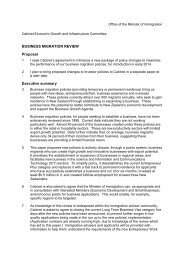
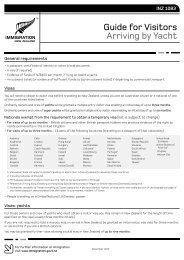
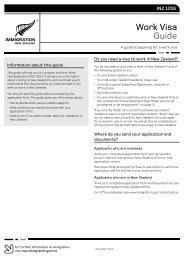
![Long Term Skill Shortage List PDF [200KB] - Immigration New Zealand](https://img.yumpu.com/15876707/1/184x260/long-term-skill-shortage-list-pdf-200kb-immigration-new-zealand.jpg?quality=85)
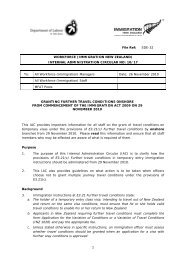
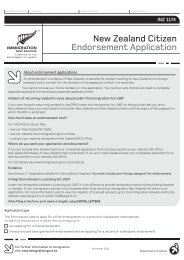
![New Zealand Residence Programme Fact Sheet PDF [161KB]](https://img.yumpu.com/14040475/1/184x260/new-zealand-residence-programme-fact-sheet-pdf-161kb.jpg?quality=85)
